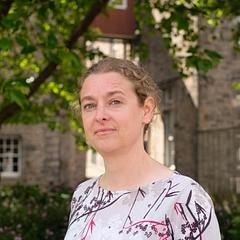NERC Consultancy Programme
Part of the Edinburgh Earth and Environment Doctoral Training Partnership - funded by the Natural Environment Research Council (NERC).
ECCI delivers the business and public policy-facing component of the programme.
ECCI delivers the business and public policy-facing component of the programme.

ECCI’s NERC Consultancy Programme connects businesses, start-ups, SMEs and third sector organisations with a NERC-funded PhD student, to undertake meaningful research projects connected to climate change.
Could your organisation benefit from the expertise of a fully-funded PhD placement? Complete a short form to submit your project by Tuesday 4 November.
A total of seven internships were successfully delivered in 2024/5 across six different hosts, matching PhD candidates with a range of industry partners in NERC priotiy areas.
Feedback was very positive, with all PhD participants confirming that the internship will be useful for their future career and eporting that they learned new skills, which included technical skills such as software installation and testing, GIS and machine lerarning skills as well as transferable skills such as communication, project management and learning how to deliver results in a fast-paced consultancy environment.
“Working with the team at […] was an excellent opportunity to work on real life applications of my research and learn new skills in a hands-on environment, whilst getting insight into how ecological consultancy businesses work. It was an invaluable experience and I would recommend it to any student!” - PhD participant
"My placement at […] was quite insightful and beneficial, and allowed me to experience first-hand the fast-paced, high-performance, but supportive working environment of an international consultancy firm." - PhD participant
All of the host companies agreed that the placements added value to their business and specifically valued the flexibility the programme offered. All are interested in hosting another placement in the future. Placement hosts included:
ClimateXChange (CXC) - based at ECCI, are Scotland’s centre of expertise on climate change, funded by the Scottish Government.
The third Scottish National Adaptation Plan (SNAP3) was published in September 2024. It commits to establish a network of adaptation experts across Scotland and map links to international institutions and research networks. The placement contributed to delivering this action by mapping out researchers, identifying existing research networks which could be expanded in future and making recommendations for the establishment of a Scottish Adaptation Expert Network.
Frontierra - Frontierra is an environmental consultancy that utilises geospatial data and satellite monitoring to analyse and evaluate climate and nature-related impacts specifically focusing on deforestation and biodiversity.
The output of the project was a research report identifying invasive pests and diseases that pose significant risks to commercial forestry.
NIRAS - NIRAS is a multi-disciplinary engineering consultancy. They believe that developing the Blue Economy must be about managing sustainable economic activities reliant on the ocean's resources while prioritizing environmental conservation and protecting vulnerable livelihoods.
The task was a thematic analysis of the seventh International Marine Conservation Conference (IMCC7) around six key dimensions, namely on policy and governance; physico-chemical dynamics; ecological dynamics. The output was a thematic analysis report which synthesises the conference presentations and key literature.
“The student was exceptionally gifted, very interested in the work and able to fit well within the business environment. I encouraged him to consider adding his CV to our consultant database to enable his skills to be picked up by our business development teams.” - Graham Haylor, Niras
PropEco - PropEco provides data-driven solutions that help financial institutions, property professionals and individuals manage the impacts of climate change. These facilitate property decarbonisation and boost the resilience of households, communities and organisations.
The student conducted a literature review on innovative machine learning methods and remote sensing techniques for the Climate Change Risk Assessment. The work involved developing python language-based codes to carry out Flood Assessment/ Forest Fire Assessment.
VolcanoTech - VolcanoTech are world leaders in the production of low-cost ultraviolet camera instrumentation for the measurement of gases. Based at the University of Sheffield with affiliated members across other universities, they are currently undergoing a spin-off process.
The work included construction and testing of a new gas calibration rig for spectroscopic instruments, including the design of a new methodology to work with the instruments; updating user manuals and creating new quick start guides, plus creating a brochure to promote VolcanoTech’s mission and products. The results have been shared on their website.
“The student spent two weeks with us conducting work for VolcanoTech developing user friendly guides for complex software and processes, alongside some equipment development work. It was extremely useful to have an extra member of the team” - Tom Pering, VolcanoTech
WeForest - WeForest is an international non-profit which implements Forest and Landscape Restoration (FLR) projects across Africa and Latin America. The organisation’s focus is on conserving and restoring forests at the landscape scale for the benefit of nature, people and climate.
WeForest 1: The aim of the placement was to provide a first analysis of data generated by a pilot project to collect hydrological data from WeForest's mangrove restoration sites in Senegal. Findings were summarised in a report and included a figure in ArcGIS to show the locations of the different sample sites.
WeForest 2: The second WeForest project involved a deeper analysis of existing socioeconomic baseline data collected for the WeForest Mulanje forest landscape restoration project in Malawi. The student disaggregated descriptive statistics for multiple qualitative and quantitative variables across the 10 project villages, thus allowing assessment of spatial variation of socioeconomic baseline realities across the project landscape.
The Edinburgh Earth, Ecology and Environment Doctoral Training Partnership (E4/5 DTP), led by the School of GeoSciences at the University of Edinburgh, is funded by NERC to recruit and train 5 cohorts of PhD students annually.
The E4 DTP brings together 32 local partners to provide a world class research and training centre and attract the most talented students to conduct frontier research in environmental sciences.
The programme offers the following:
As an E4/5 DTP student, you can get a fully-funded PhD studentship for a minimum of 3.5 years (42 months). It covers stipend and fees as well as research costs.
“The project has helped me to see the advantages of doctoral training in solving a range of critical problems outside of an academic context.”' Andrew, NERC E3 DTP student
To find out more about NERC E4/5 DTP, have a look at the University of Edinburgh website.
A total of 10 internships were successfully delivered in 2023/24, matching PhD candidates with a range of industry partners in NERC priotiy areas.
Feedback was very positive, with all PhD participants confirming that the internship will be useful for their future career and eporting that they learned new skills, which included technical skills like developing code, gaining more insights into their specific field of research as well as transferable skills like communication, project management, networking and stakeholder engagement.
“I had a really positive experience. I was able to apply skills I already had to a policy-oriented environment which I had little experience of before.” PhD candidate
“The 10-day placement was a really helpful experience, giving me an insight into how the methods and concepts from my PhD can be applied within a commercial setting. Meeting and interacting with people outside of academia is also always refreshing!” PhD candidate
All the companies agreed that the placements added value to their business and almost all of them are interested in hosting another placement in the future. Placement hosts included:
The company specialises in capturing biogenic CO2 emissions from diverse sources such as distilleries and biogas facilities, using their proprietary and innovative capture technology. The placement output was a lifecycle carbon assessment of their carbon removal value chain, specifically the embedded emissions of their capture units, the emissions incurred during road-haul aggregation (and shipping to a storage location), and embedded emissions in the storage sites.
PLMA is a group of farmers and land managers in the Pentland Hills Regional Park. They collaborate with a range of stakeholders to improve the park experience for everyone who works in, visits, and manages this valuable natural resource. The student crafted a pamphlet for the Pentland Land Managers Association, created for their upcoming website promoting citizen science involvement. It offers a snapshot of the Pentland area, highlights small mammal species, and provides surveying tips with detailed guides.
Planetary AI seeks to utilise the advances in machine learning and artificial intelligence to better understand the earth’s surface and subsurface geology. We aim to identify new resources of critical metals required for the green energy transition. During the placement, the student used the Tellus SW geological survey data to develop a proofof-concept machine learning model trained to identify areas prospective for Tungsten.
SCCS is the largest carbon capture and storage (CCS) research group in the UK, providing a single point of coordination for CCS research, from capture engineering and geoscience to social perceptions and environmental impact through to regulation and economics. The placement was designed to support and coordinate the development of material for a new Continuing Professional Development (CPD) short course "Introduction to Hydrogen for the Public Sector" for the Scottish Government as well as the curation of a selection of case studies showcasing potential applications of clean hydrogen.
Find out more about the team involved with this project.

Head of Climate Partnerships / SCIS Strategy Director

Project Officer, Climate Partnerships